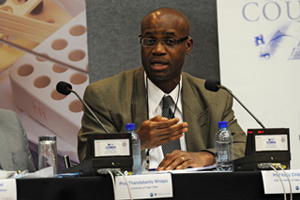UCT & MRC announce strategic partnerships worth R370m with Bill and Melinda Gates Foundation
21 January 2014 | Story by Newsroom
The South African Medical Research Council (MRC) and University of Cape Town (UCT) are delighted to announce the establishment of two strategic multi-year partnerships with the Bill and Melinda Gates Foundation (BMGF). The partnerships' purpose is to develop new medicines, vaccines and other biotechnologies against HIV/AIDS, TB and malaria. These unprecedented partnerships - to be led by South African scientists and backed by the South African Government's Departments of Science and Technology, and Health - seek to employ the collective skills, and research networks within and outside South Africa to deliver life-saving benefits.
The partnerships consist of two different programmes. In one programme, the MRC is receiving approximately R125 million (US$11.7 million) from the BMGF, for its Strategic Health Innovation Partnerships (SHIP) unit to lead and fund world-class research aimed at developing AIDS and TB vaccines. This funding is in addition to R130 million from the Department of Science and Technology (DST) and R60 million from the Department of Health (DOH), granted over a three-year period. SHIP's role will be to build on the scientific leadership of South African scientists in these diseases and establish, fund and manage research programmes on innovative products and approaches to prevent AIDS and TB.
In the second programme, UCT's Drug Discovery & Development Centre, H3-D, is receiving approximately R55 million (US$5 million) from the BMGF over a five-year period. This will enable H3-D to build on its experiences and track record in integrated modern drug discovery and preclinical development, to develop novel clinical drug candidates to address TB and malaria challenges. This builds on the funding (R50 million) provided to H3-D by SHIP and the Technology Innovation Agency (TIA). In 2012 H3-D, in collaboration with the Medicines for Malaria Venture, announced the discovery of a novel chemical compound with the potential to impact both malaria control and eradication. The clinical candidate, codenamed MMV390048, is scheduled to enter human clinical trials this year as part of this programme.
"The MRC's initiative to create SHIP gives South African scientists a unique opportunity to lead the process of developing new technologies to improve health," says Professor Salim Abdool Karim, President of the MRC. "In this joint venture with the BMGF and DST, SHIP will be funding innovative research on HIV and TB, principally focused on developing vaccines for prevention. South Africa has one of the worst HIV and TB epidemics in the world and stands to be among the biggest beneficiaries of future successes in this programme."
Professor Thandabantu Nhlapo, Acting Vice-Chancellor of UCT, says the university is proud to be associated with partnerships that strive to alleviate some of the world's major burdens, operating right here from Africa. "Our partnership with the BMGF is a vote of confidence in UCT's scientific capabilities and will help Africans develop solutions for Africa, in Africa. As a research-led institution, UCT is dedicated to developing and extending knowledge that addresses the main societal challenges facing our country, continent and the world. When we're empowered by funding and partnerships from committed friends abroad we have the means to use our scientific capability to start solving our local health problems."
Dr Trevor Mundel, President of the BMGF's Global Health Programme, says: "South Africa has world-class researchers and the infrastructure necessary to develop the kinds of innovative health solutions needed to accelerate progress against TB, HIV, malaria and other infectious diseases. We are excited to support these partnerships, which have enormous potential to tackle the tough challenges and support those most in need in South Africa and across the continent."
Collectively HIV/AIDS, TB and malaria not only contribute to Africa's high disease burden, but also the world's. "Africa's population is set to double by 2050, and Africa needs to start discovering and developing medicines for its own people," says Professor Kelly Chibale, Founder and Director of H3-D. "This partnership with the BMGF is a vital step to ensure continued development of H3-D as it seeks to bridge the gap between basic science and clinical development to deliver new life-saving drugs, while also developing a critical mass of the next generation of skilled African scientists. The international visibility of a strong South African-based H3-D Centre with critical mass will ensure access to major advances in the field of drug discovery and development. These are critically important for the development of South Africa and our continent."
The DST has been instrumental in the establishment of SHIP and has been supporting H3-D as a high-priority platform through the TIA. The partnerships with the BMGF, which add to the South African Government's own commitment, are a reflection of the quality of scientists and scientific research in South Africa.
 This work is licensed under a Creative Commons Attribution-NoDerivatives 4.0 International License.
This work is licensed under a Creative Commons Attribution-NoDerivatives 4.0 International License.
Please view the republishing articles page for more information.










